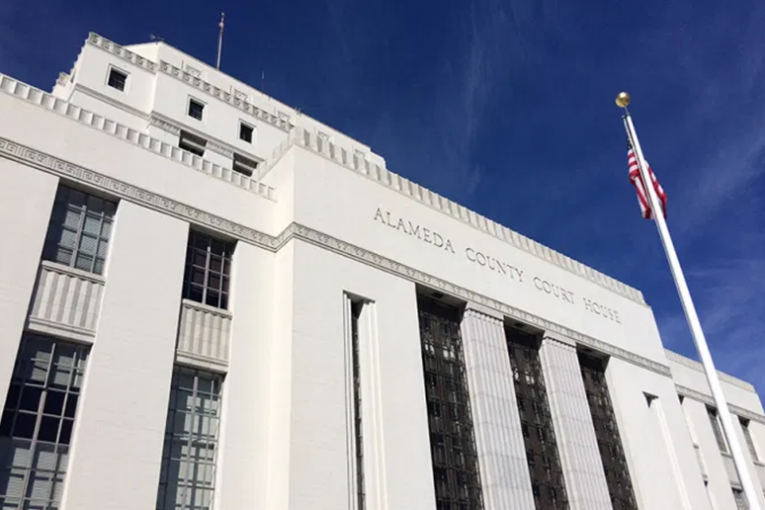
By Aparna Komarla
This report is written by the Covid In-Custody Project — an independent journalism project that partners with the Davis Vanguard to bring reporting on the pandemic in California’s county jails and Department of Corrections and Rehabilitation (CDCR) to the public eye. Refer to our website to view and download the raw data.
The Alameda County Public Defender’s Office is raising concerns about Santa Rita Jail detainees access to court and counsel. Throughout the pandemic, widespread quarantines, court closures, and staffing shortages, have affected court proceedings significantly. These issues became more apparent during the Omicron surge, when over 20% of Santa Rita Jail had tested positive and housing unit quarantines were rampant due to exposure to positive cases or positive residents.

In a recent Public Protection Committee meeting, Assistant Public Defender Patrick Jensen, explained to the Board of Supervisors how the current arraignment process has limited incarcerated people’s access to counsel. Prior to COVID, detainees would be brought to court and interviewed by attorneys, following which a request for release would be made. But during COVID, detainees are not being brought to court and remain alone in jail without any contact with an attorney (not even a video meeting). Consequently a motion for release has to be filed without any information, he explained.
Jensen added that the lack of contact during the pre-trial period means that attorneys lose housing, medical, and psychiatric information about the detainee. Attorneys also lose access to critical defense evidence. “Access to justice is denied when we don’t follow the law regarding pre-trial confinement,” he said.
Pre-COVID, visitation was available through multiple avenues:
- In person contact visit with an appointment
- In person non-contact visit without an appointment
- Video visitation through polycom scheduled a day in advance
- Video visit through GTL (not confidential)
But during COVID, Jensen explained that contact visits (1.) have been eliminated completely and video visits (3. and 4.) are unavailable when a detainee is under quarantine. Though the sheriff’s COVID protocol states that attorneys should be permitted to have non-contact visits even if defendants are on quarantine (unless they are COVID positive), the public defenders have not been granted access. Jensen pointed out that non-contact visits (2.) are frequently unavailable even with an appointment or when a detainee is under quarantine.
Effectively, contact with attorneys has been drastically cut short. During the peak of the Omicron surge, when over 50 housing pods were quarantined, detainees’ access to counsel was severely restricted.
The sheriff’s office, in response, provided some data to show that non-contact visits and video visits have been occurring at the facility. However, they left a critical data point out of their response — the time period for which the visits were tabulated. Jail Commander Yesenia Sanchez stated that on average every week there are about 97 non-contact attorney visits, 4 contact attorney visits, and 65 video interviews. While these numbers may seem promising, a key dimension of the Public Defenders Office’s concerns, is access to counsel specifically during quarantine or isolation. Since the number of quarantined units and hence residents changes dramatically every week or month, Commander Sanchez’s data does not hold much value, as it does not speak to the number of non-contact or video visits facilitated when quarantines have been widespread.
To date, the sheriff’s office has not provided any concrete data or information to show that non-contact visits and video hearings are taking place as they should. The Public Defenders Office has continued to voice their concerns about the issue.
In a public forum for community members to discuss COVID-related issues, Kathy Ryals, a public defender in Alameda County said, “It is very difficult to get a date in the bail court to have a motion heard. Transportation staff at SRJ is limited and with quarantine, many inmates are not being brought to Dept. 13 for those motions. Dept. 13 has no video hookup to SRJ so if the inmate is not brought, the motion won’t be heard. There is a significant backup.”
“Individuals in quarantine are frequently not brought to video arraignment for days beyond what would be their normal arraignment period. They are listed as med scratch and not arraigned,” Jensen explained. “We had several people on calendar today [Jan. 28] in Department 712 Felony Arraignment court for South County who have been in quarantine since last week, and they have just been trailing day to day for Arraignment.”
Another public defender, Daniel Duvernay, chimed in to support Jensen’s comments. “Individuals in quarantine are also not brought to court over video for other important court hearings such as pre-trial hearings and report and sentencing,” he said.
The Public Defenders Office has made several suggestions for the sheriff’s office to remedy the situation. Overall, they want to ensure that all detainees have access to court and counsel in a timely manner. Specifically, they have asked the sheriff to:
- Increase access to video interviews (including nights and weekends)
- Restore all in person non-contact interviews on a drop-in basis
- Allow attorney access to clients at the jail between 3 –6pm
We are yet to see if the sheriff’s office will take these suggestions into account and increase residents’ access to counsel. Ultimately, all residents should have access to a court and counsel in a timely manner. If remote proceedings continue, the sheriff’s office should ensure that residents have access to counsel as granted to them by law.